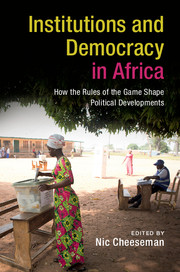Book contents
- Frontmatter
- Dedication
- Contents
- List of Figures
- List of Tables
- List of Contributors
- 1 Introduction: Understanding African Politics: Bringing the State Back In
- Part I Institutional Foundations
- Part II Law and Order
- 5 Constitutions: The Politics of Constitutional Reform
- 6 The Police: Laws, Prosecutions and Women's Rights in Liberia
- 7 The Bureaucracy: Policy Implementation and Reform
- Part III Elections, Parties and Political Competition
- Part IV Countervailing Institutions
- Index
- References
6 - The Police: Laws, Prosecutions and Women's Rights in Liberia
from Part II - Law and Order
Published online by Cambridge University Press: 05 February 2018
- Frontmatter
- Dedication
- Contents
- List of Figures
- List of Tables
- List of Contributors
- 1 Introduction: Understanding African Politics: Bringing the State Back In
- Part I Institutional Foundations
- Part II Law and Order
- 5 Constitutions: The Politics of Constitutional Reform
- 6 The Police: Laws, Prosecutions and Women's Rights in Liberia
- 7 The Bureaucracy: Policy Implementation and Reform
- Part III Elections, Parties and Political Competition
- Part IV Countervailing Institutions
- Index
- References
Summary
Of all the formal institutions that make up a state, the rule of law and the police designated to enforce it are two of the most important (Stromseth 2008). The rule of law matters for the capacity of the state to ensure security and order, but also for maintaining a sense of equality among citizens. After all, it is by receiving legal privileges or punishments that many individuals get ahead or fall behind in life; the African elite has been formed, in part, through the selective implementation of rules and laws by the judiciary and police. Indeed, despite the central importance of the system of law and the police, public perception of the police and judiciary is mostly negative (Armah-Attoh et al. 2007). Underfunded and poorly trained, the police are often viewed as part of the problem rather than as a solution (Richmond and Alpin 2013). Thus, if any part of the African state conforms to the ‘institutionless’ school described in Chapter 1, it would be the police. This chapter considers the implementation of the rule of law in Africa with respect to one of the areas in which citizens’ formal rights are most often overlooked – sexual violence in post-conflict countries. In doing so, it highlights the many ways in which the police fail vulnerable girls and women, but also demonstrates that even in the most unlikely of contexts the formal institutions of the state can be made to work in order to deliver better outcomes for marginalised groups.
Sexual violence, and other forms of violence against women (VAW), occurs before and during conflict and does not cease in its aftermath. Instead, women continue to be victimised after wars have ended. The United Nations (UN), which has spearheaded the post-conflict peacebuilding effort in several African countries, has underscored the role of police in preventing this violence and in enforcing the relevant laws to ensure the prosecution of offenders (United Nations Women 2011). Prevention and enforcement are important for women's security and their wellbeing as sexual violence has physical, psychological, social and economic effects on the lives of victims. Police enforcement of rape and other sexual violence laws also indicates a strengthening of the rule of law and a strong rule of law is critical for building sustainable peace in the aftermath of conflict (Stromseth 2008).
- Type
- Chapter
- Information
- Institutions and Democracy in AfricaHow the Rules of the Game Shape Political Developments, pp. 137 - 159Publisher: Cambridge University PressPrint publication year: 2018
References
- 3
- Cited by



